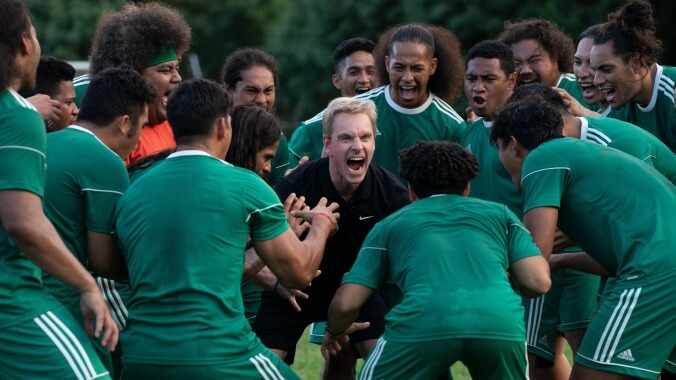Next Goal Wins review: Taika Waititi returns to his roots
Michael Fassbender stars as a disgraced coach seeking redemption in Waititi’s formulaic but entertaining underdog soccer comedy

The marketing for Taika Waititi’s Next Goal Wins promotes the film as an underdog sports comedy about an ill-fated South Pacific soccer team, full of the highs and mostly lows of a struggling squad trying to make good. Revisiting the fallout from the worst loss in World Cup history—when Australia defeated American Samoa 31-0 in a 2001 qualifying match—provides Waititi with plenty of predictably amusing opportunities to good-naturedly skewer the ineptitude of the Polynesian team, but he also has a parallel agenda.
In adapting Mike Brett and Steve Jamison’s 2014 documentary Next Goal Wins, Waititi and co-screenwriter Iain Morris’ portrayal of the American Somoa team’s halting transformation under a mainland American coach emphasizes the enduring strength of the island community and their affinity for the beliefs and rituals of Polynesian culture. The clash of worldviews between the Samoan soccer club and their clueless coach effectively elevates the film above an ordinary sports movie, even if expectations for the team’s success are set pretty low.
For Waititi, Next Goal Wins marks the Oscar-winning Maori filmmaker’s first return to Polynesia since his memorable 2016 New Zealand-set comedy Hunt For The Wilderpeople. Unlike the inventive plot of its predecessor though, the narrative arc of Next Goal Wins offers few genuine surprises, hewing closely to the conventions of the underdog sports movie. So it’s little surprise that a decade after their infamous World Cup loss, the American Samoa team remains last in international rankings. With a part-time lineup of amateur players and an inexperienced coaching staff, the squad faces the competition’s upcoming 2011 qualifying round completely unprepared.
More out of desperation than any realistic alternative, Football Federation of American Samoa head Tavita (Oscar Kightley) decides to take drastic action, demoting kindhearted but undisciplined coach Ace (David Fane) and replacing him with Dutch-American soccer veteran Thomas Rongen (Michael Fassbender), who’s rapidly running out of career options after getting fired from the American team.
Tavita provides Rongen with one seemingly simple objective: the team needs to score at least one goal in the upcoming qualifiers. First, though, the new coach will require an attitude adjustment as he struggles to overcome anger management issues, depression, and alcohol dependency after his recent separation from his wife Gail (Elisabeth Moss), who is now dating Rongen’s former boss Alex (Will Arnett). Rongen begins training by ridiculing the team members for their disorganization, lack of skill, and questionable motivation in an effort to vent his frustration with his new coaching assignment. In an off-putting display of homophobia, he particularly seems to have it out for striker Jaiyah (Kaimana), a “fa’afafine,” or traditional Samoan transgender woman, who isn’t about to be intimidated by some foul-mouthed, skinny white dude.
Part of Rongen’s aversion to training the team is his complete disinterest in Samoan culture, along with the family and community responsibilities that the team members prioritize. They’re expected to work multiple jobs in the uncertain island economy, support their relatives, and demonstrate their Christian credentials (the team refuses to practice on Sundays), which contributes to constant stress that often leaves the players exhausted. Rongen won’t give their concerns much consideration though, relentlessly drilling them on passing and shooting skills, forcing them to run sprints and constantly berating them for their deficiencies.
In an effort to bolster the team’s prospects, Rongen begins seeking recruits from the ranks of the team’s former players. His efforts face widespread disinterest though, including from Nicky Salapu (Uli Latukefu) the team’s goalie from a decade earlier, while the few players who do rejoin add little to the squad’s qualifications.
Much of Rongen’s irritability is rooted in his own personal misery and alcohol abuse, as he attempts to come to terms with the disintegration of his family, the decline of his career, and his considerable personal demons. Fassbender, not particularly known as a comedic actor, seems a curious choice here, but his somewhat imperfect fit for the character mirrors Rongen’s own lack of synergy with the team and it turns out that he’s not without some ironic, self-deprecating charm in the role. Without the support of Tavita, Rongen has little chance of persevering. Kightley delivers an understated portrayal of the coach’s Samoan colleague as a constant source of encouragement, always providing a positive, if slightly skewed, perspective on life and sports.
Waititi’s gentle humor, which plays up the team’s inexperience with plenty of intra-squad rivalry and shockingly inept gameplay, never resorts to ridicule, remaining rooted in his own Maori heritage and a celebration of Pacific island culture. This extends to the supporting cast, rife with colorful characters (many based on actual team members) representing Samoan, Tongan, and Hawaiian backgrounds, filling out the team lineup. Waititi also contributes an amusing cameo as an eccentric local figure who initially introduces the tale and guides the audience through the Polynesian cultural setting.
Shot in Hawaii with Oahu doubling for American Samoa, Next Goal Wins may not seem like the most original film, but the fact that it’s based on actual, if somewhat improbable, events means that it ultimately earns its uplifting perspective, owing largely to Waititi’s heartfelt commitment to the story.
Next Goal Wins opens in theaters November 17